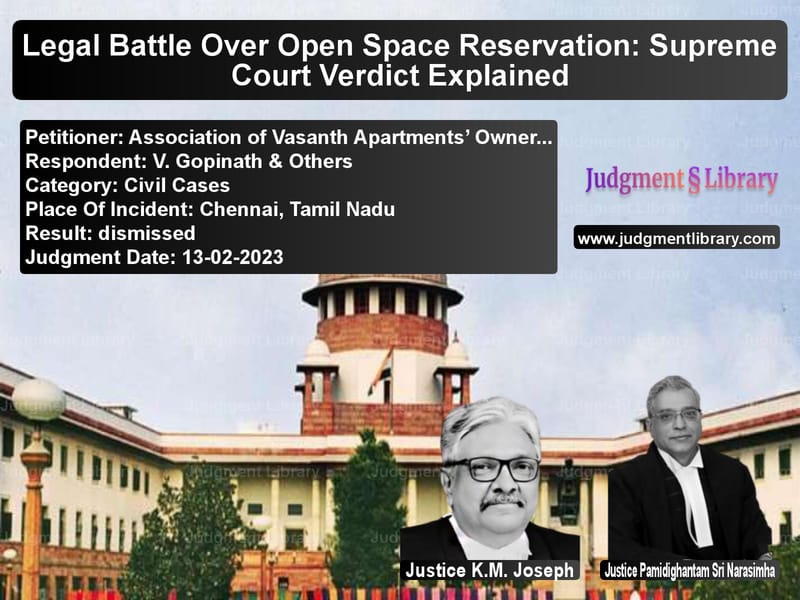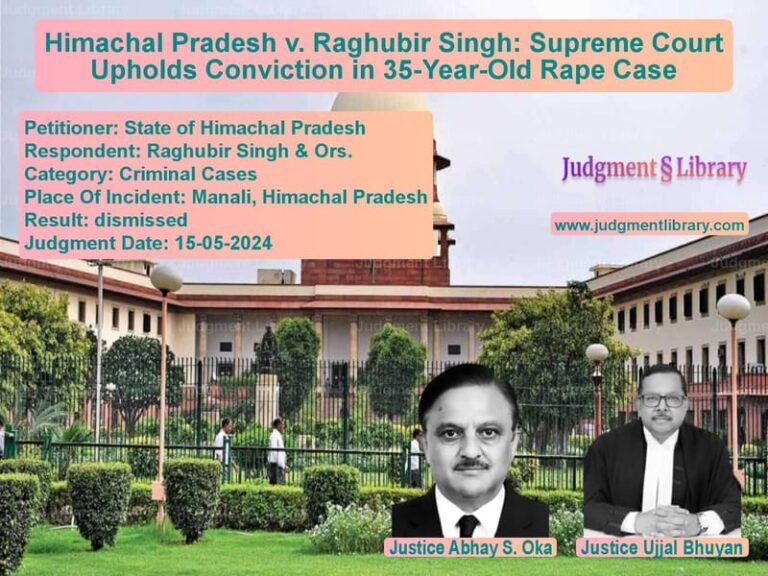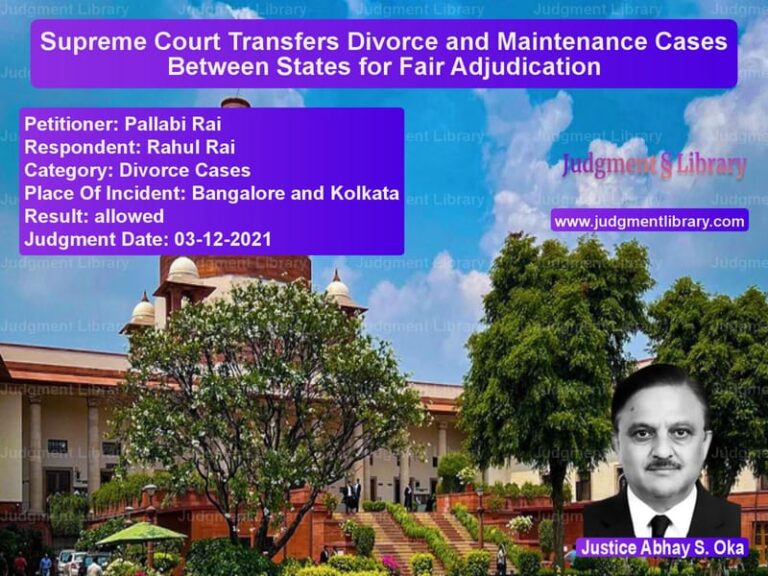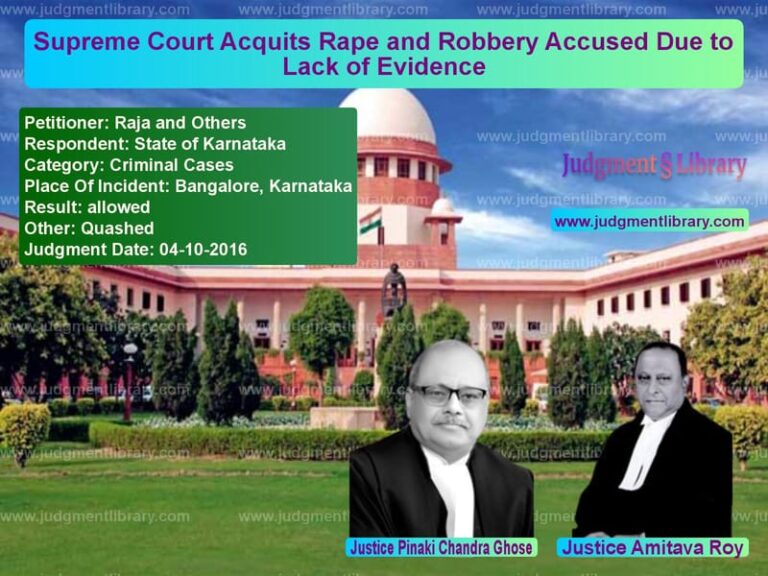Legal Battle Over Open Space Reservation: Supreme Court Verdict Explained
The case before the Supreme Court of India concerns a dispute over the mandatory transfer of Open Space Reservation (OSR) land in large-scale development projects. This case is significant as it delves into the constitutional validity of compelling developers to transfer portions of their land to civic authorities for public use without monetary compensation. The Supreme Court, in its detailed judgment, examined whether such a regulation was a legitimate urban planning measure or an infringement on property rights.
Background of the Case
The Association of Vasanth Apartments’ Owners, the appellant, challenged the rule mandating a gift of land to civic authorities under urban planning regulations. This rule required developers to reserve and transfer 10% of the layout area to the municipal authority for use as a park or open space. The appellant claimed that this requirement amounted to an unconstitutional deprivation of property without compensation and thus violated Article 300A of the Indian Constitution.
On the other hand, the respondents, including the Chennai Metropolitan Development Authority (CMDA) and the Tamil Nadu government, defended the rule as an essential urban planning measure designed to enhance public welfare by ensuring adequate open spaces in rapidly growing urban areas.
Petitioner’s Arguments
The petitioners contended that the impugned rule was unconstitutional for several reasons:
- It violated property rights enshrined in Article 300A by compelling landowners to part with their land without compensation.
- The Development Control Rules (DCR), under which the transfer was mandated, did not have statutory backing and thus could not override property rights.
- The rule was arbitrary and discriminatory, as it applied only to layouts exceeding 10,000 square meters, creating an unfair distinction between large and small developers.
- Land reserved for OSR purposes was often misused by the municipal authorities, further undermining the justification for its transfer.
Respondent’s Arguments
The respondents, including the Tamil Nadu government and CMDA, defended the regulation on the following grounds:
- The DCR was an integral part of the Master Plan, which was prepared following statutory procedures, including public consultation and government approval.
- The OSR regulation was designed to ensure sustainable urban development by maintaining adequate open spaces for public use, which is a recognized principle of urban planning.
- There was no blanket deprivation of property; rather, it was a regulatory measure applicable only to large-scale developments to ensure equitable urban growth.
- Similar regulations existed in other cities in India and around the world to maintain the environmental and social quality of urban spaces.
Key Observations by the Court
The Supreme Court, after examining the arguments presented by both sides, made several important observations:
- The requirement for OSR land transfer was part of a broader urban planning framework designed to balance private property rights with public interest.
- The DCR had statutory backing as it was part of the Master Plan, which underwent extensive scrutiny and approval by the government.
- Property rights under Article 300A are subject to reasonable restrictions imposed by law in the interest of the public.
- The classification of layouts based on their size was not arbitrary, as larger developments have a greater impact on urban infrastructure and require proportionate contributions to communal spaces.
Judgment
Based on these observations, the Supreme Court upheld the validity of the OSR regulation and dismissed the appeal. The court clarified that civic authorities must ensure that OSR land is strictly used for public welfare and not misused for commercial purposes.
The judgment reaffirmed the principle that while property rights are protected, they are not absolute and can be regulated in the interest of planned urban development. It also emphasized the need for transparency and accountability in the implementation of urban planning regulations to prevent misuse.
Conclusion
This landmark judgment sets a precedent for similar cases concerning urban planning regulations and property rights. It underscores the balance that must be struck between individual property rights and collective urban welfare, reaffirming the role of planning authorities in shaping sustainable cities.
Petitioner Name: Association of Vasanth Apartments’ Owners.Respondent Name: V. Gopinath & Others.Judgment By: Justice K.M. Joseph, Justice Pamidighantam Sri Narasimha.Place Of Incident: Chennai, Tamil Nadu.Judgment Date: 13-02-2023.
Don’t miss out on the full details! Download the complete judgment in PDF format below and gain valuable insights instantly!
Download Judgment: association-of-vasan-vs-v.-gopinath-&-others-supreme-court-of-india-judgment-dated-13-02-2023.pdf
Directly Download Judgment: Directly download this Judgment
See all petitions in Property Disputes
See all petitions in Landlord-Tenant Disputes
See all petitions in Specific Performance
See all petitions in Damages and Compensation
See all petitions in Contract Disputes
See all petitions in Judgment by K.M. Joseph
See all petitions in Judgment by P.S. Narasimha
See all petitions in dismissed
See all petitions in supreme court of India judgments February 2023
See all petitions in 2023 judgments
See all posts in Civil Cases Category
See all allowed petitions in Civil Cases Category
See all Dismissed petitions in Civil Cases Category
See all partially allowed petitions in Civil Cases Category







